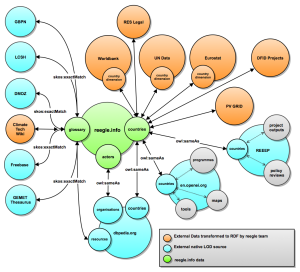Guest post number eleven in the OKCon speaker series is from Florian Bauer, Denise Recheis and Martin Kaltenböck. They have organized and will be holding the workshop ‘How Linked Open Data (LOD) supports Sustainable Development & Climate Change Development’ in the Open Development & Sustainability programme, on Wednesday 18 September, 11:45 – 13:15 @ Room 8, Floor 2. Get in touch with them now to register your place!
How Linked Open Data (LOD) supports Sustainable Development & Climate Change Development
The idea of using LOD first emerged as a useful technology for data and information management in the health sector as an area where many different aspects need to be combined to create a bigger picture. Sustainable development is another such complex area where many factors are needed to make informed decisions. For both, LOD brings better decision making as well as awareness building.
 Often these snippets of information are retrieved across different research fields and later stored in hundreds of different information silos that are not connected to each other. The same can be said about modern energy systems that combine new and conventional sources of energy, centralized and on-site generation and a complex distribution infrastructure. Again, a lot of data is needed to smooth the way for the transition towards clean energy.
Often these snippets of information are retrieved across different research fields and later stored in hundreds of different information silos that are not connected to each other. The same can be said about modern energy systems that combine new and conventional sources of energy, centralized and on-site generation and a complex distribution infrastructure. Again, a lot of data is needed to smooth the way for the transition towards clean energy.
Ambitious targets are already in place to reduce greenhouse gas emissions and increase access to sustainable energy for more people at the same time. We seriously lag behind in reaching these goals and often find that what’s missing is often proper access to essential information. Such information arrives too late, has not been processed to a useful format or is simply not available for open use and re-use.
We believe that the LOD principles are the right mechanism & technology that can support our efforts to tackle these global issues. Today networking is being accepted as a crucial part of development, and that can also be said about networked, linked information/data. Linked Open Data is often described as Open Data interlinked with other datasets. Going from link to link, connections that may not be obvious instantly are drawn together – a bit like the introduction of hyperlinks now connects many pages on the web across different websites and allows the user to dive deeply into a subject. Only in the case with LOD, it’s the machine that can dive into this knowledge and provide the user with tailored results to tackle problems.
Right now, many of those who need data to make informed decisions have caught on to the logical benefits of (linked) open data. More convincing needs to be done to see more relevant data being released in a way (format, license, links) that makes it valuable in the quest to tackle global, complex problems. “Concerns about opening up data, and responses which have proved effective” by Christopher Gutteridge, University of Southampton and Alexander Dutton, University of Oxford has put together all the usual thick-as-a-brick arguments and proposed solutions and answers. Classics include being worried about misinterpretation of the data, data not being very interesting, and possible future use in a research paper, as well as technical, legal and financial concerns.
The Renewable Energy and Energy Efficiency Partnership (REEEP) and the Global Buildings Performance Network (GBPN) are two organizations active in the promotion of clean energy and energy efficiency and have embraced LOD as a means to accelerate their work and strengthen their networks. GBPN provides its building efficiency data in this format to ensure that the information can be used in relevant contexts as they arise. REEEP is using available open data to draw together country dossiers focusing of clean energy in its information portal reegle.info and also sees its role as a broker between information providers and users. The Semantic Web Company (SWC) has been working in the field on semantic web technologies for many years and has helped making this state-of-the-art way of working with data accessible to several organizations in the energy and sustainability sector. All three organisations see sustainable development as an excellent way to showcase the benefits of LOD, and therefore have joined forces to organise a workshop at this years Open Knowledge Conference to highlight use-cases of Linked Open Data and discuss lessons learnt.
Florian Bauer, Operations & IT Director, Renewable Energy and Energy Efficiency Partnership
Denise Recheis, Knowledge Manager REEEP
Jens Laustsen, Technical Director, Global Buildings Performance Network, Martin Kaltenböck, Managing Partner, Semantic Web Company

